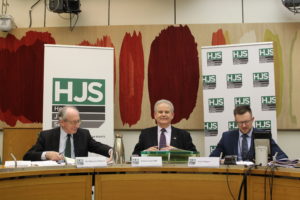Core Assumptions and British Strategic Policy

- This event has passed.
Core Assumptions and British Strategic Policy
24th February 2020 @ 6:00 pm - 7:00 pm

Since the end of the Cold War, Britain established an increasingly ‘global approach’ to its foreign, security and defence policy. This approach foresaw the acceleration of globalisation, the rise of liberal democracy around the world, the continuity of Western technological ascendancy, and conditions preferable to a less cohesive and robust British nation-state. With the onset of climate change and great power competition, as well as Brexit, it is no longer clear the extent to which these core assumptions are still valid.
By kind invitation of the Rt Hon Julian Lewis MP, the Henry Jackson Society invites you to a discussion with Sir Malcolm Rifkind, a former Defence and Foreign secretary, and James Rogers, the Director of the Global Britain Programme at the Henry Jackson Society, to contemplate on how the United Kingdom should restructure its strategic policy to make it fit for the twenty-first century.

James Rogers is Director of the Global Britain Programme at the Henry Jackson Society and Editor-in-Chief of The British Interest. Formerly, he held a number of positions at the Baltic Defence College in Tartu, Estonia. There he was Acting Dean (2016), Director of the Department of Political and Strategic Studies (2015-17) and Lecturer in International Relations (2012-15).
Previously, James worked at the European Union Institute for Security Studies in Paris, firstly as a Visiting Fellow (2008) and then as an Associate Fellow (2013) – latterly as lead rapporteur for a research project commissioned by the European Union Military Committee. He has also worked on research projects for several other institutions, including the Development, Concepts and Doctrine Centre at the Ministry of Defence, RAND Europe, the Egmont Institute, and the European Council on Foreign Relations. James has given oral evidence to both the Foreign Affairs and Defence Select Committees and gives regular briefings to the Foreign and Commonwealth Office and to the Ministry of Defence.
He has had his commentary carried in The Times, the Daily Telegraph and elsewhere. He regularly appears on media outlets, including the BBC, Sky News and LBC Radio.
James holds a BSc Econ with First Class honours in International Politics and Strategic Studies from Aberystwyth University and an MPhil in Contemporary European Studies from the University of Cambridge.

Sir Malcolm Rifkind is a British politician who served in various roles as a Cabinet minister under Prime Ministers Margaret Thatcher and John Major, including Secretary of State for Scotland (1986–1990), Defence Secretary (1992–1995), and Foreign Secretary (1995–1997).
Rifkind was the MP for Edinburgh Pentlands from 1974 to 1997. In 1997, his party lost power and he lost his seat to the Labour Party. He attempted, unsuccessfully, to be re-elected in Pentlands in 2001; the constituency was abolished before the 2005 general election and he was adopted, and subsequently elected, as the Conservative candidate for Kensington and Chelsea. He announced his intention to seek the leadership of the party before the 2005 Conservative Party leadership election, but withdrew before polling commenced.
Rifkind stood for the Kensington seat and was elected at the 2010 general election with a majority of 8,616 votes. He was appointed Chairman of the Intelligence and Security Committee of Parliament by the Prime Minister, David Cameron, on 6 July 2010. In January 2015 he was appointed by the OSCE as a member of their Eminent Persons Panel on European Security. In December 2015, Rifkind was appointed a Visiting Professor by King’s College, London in their Department of War Studies. He was also invited to become a Distinguished Fellow at the Royal United Services Institute (RUSI). In July 2016, his memoirs, Power and Pragmatism, were published. In 2017, Rifkind was invited by the UK Government to become the British Co-Chairman of the Belvedere Polish–British Forum.

Julian Lewis MP is a Conservative Party politician in the United Kingdom, who has been Member of Parliament for New Forest East in Hampshire since the 1997 general election. Dr Lewis is a supporter of the Eurosceptic group Leave Means Leave. He held the shadow government post of Minister for the Armed Forces from May 2005 – May 2010.
Following the 2010 General Election and the formation of the Conservative-Liberal Coalition Government, Dr Lewis was appointed as a member of Parliament’s Intelligence and Security Committee in September 2010. He has also been a Vice-Chairman of the Conservative Friends of Poland. He was elected as a member of the Defence Select Committee at a by-election in October 2014, whilst remaining on the Intelligence and Security Committee of Parliament. In June 2015, he was elected to the Chair of the Commons Defence Select Committee by 314 votes to 242, and in July 2017 he was re-elected to this position, in the new Parliament, by 305 votes to 265. Dr Lewis supervised more than 30 Inquiries, during the 2015-17 and 2017-19 Parliaments, before deciding to not seek re-election to the Defence Select Committee Chairmanship following the 2019 General Election.
***
EVENT SUMMARY

James Rogers, the author of the “Core Assumptions and British Strategic Policy” report, presented the policies that could be included in the UK’s foreign and defence system in the next years. According to J. Rogers, one of the key policy recommendations that Britain could implement in order to secure its interests, is to continuously test the British core assumptions.
After analysing security and defence reviews and listening to ministerial speeches, it became evident that there was a number of trends that all these speeches had in common. These assumptions could be divided into three groups. The first was related to the global and conceptual level, the second to the geographic area of interest of the British State, and the last one concerned the UK as a power in the international system.
According to James Rogers, some of the assumptions are coming “untamed”, while the changing international environment making them outmoded or obsolete. There are some reasons (“manifested trends”) that can explain this phenomenon. Firstly, it is geopolitics and particularly the Russian revisionist tensions, but also China’s building of an artificial island at the South Chinese Sea, that could be seen as a threat. The second reason is the return of the major power competition and the failed states’ zone of chaos. Finally, there is one more major challenge: climate change.
Globalisation, led to the rise of authoritarian powers like Russia and China, helped them get richer, while Britain is becoming more open to foreign interference. “It is important to remember that these authoritarian powers are not our friends”, J. Rogers said. Thus, it could be argued that globalisation and the rise of the authoritarian regimes are interconnected.
Sir Malcolm Rifkind argued that what we have seen to the moment is a “new equilibrium”, with Britain having “two steps forward, one step back”. As far as the globalisation is concerned, he mentioned that it is not the issue of “western decline”, but other countries’ expansion of economic growth with China’s overtaking of the UK in terms of power and influence.
What should be mentioned as well, is the question of Britain’s “punching above its weight”, in particular, that there is a limit in that. “You cannot be a great power, unless you have the economic, political and military strength to back that up”. Coming from this, Britain is punching above its weight, while “its weight is not dramatic”, and realistically it can aspire to have a medium influence on the affairs of the world.
When it comes to the UK’s foreign and defence policy, the single most important objective has to be its security, in other words, Europe’s security. As an island-nation dependant on trade (e.g. in Asia Pacific), Britain’s destiny is among others to prioritise its maritime capability.
RELATED EVENTS
The Dangers of US Isolationism
In contrast to Western democracies that seek economic growth and peaceful coexistence, a new set of autocrats has emerged, each with their respective territorial ambitions. Three of the most notable powers … Continued
How Mongolia is Transforming into a Beacon for Foreign Direct Investment in East Asia
Lord David Cameron’s April 2024 visit to Mongolia and Central Asia demonstrates the growing importance that London places on protecting and promoting British interests in the Indo-Pacific region. A new report … Continued




